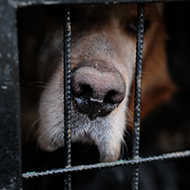
The Animal Welfare (Sentencing) Bill has passed its final reading in Parliament.
Maximum prison sentences for animal cruelty will increase from six months to five years under new legislation set to be given Royal Assent today (29 April).
On Wednesday (28 April), The Animal Welfare (Sentencing) Bill passed its final reading in Parliament and will now be delivered to the Queen for her approval before passing into law.
The Bill, expected to come into force later this year, will give courts the flexibility to impose tougher sentences for the worst animal abusers.
It will bring England and Wales in line with Scotland and Northern Ireland, where convicted animal abusers can be imprisoned for up to five years.
Animal welfare campaigners and charities have long called for tougher prison sentences for cruelty cases. RSPCA chief executive Chris Sherwood hailed the news as a ‘huge step forward for animal welfare in the UK’:
“Tougher sentences will act as a stronger deterrent to potential animal abusers and will help us in our aim to cancel out animal cruelty once and for all,” he said. "This reform is long overdue - for many years, the most violent and horrific abuse and cruelty received a maximum penalty of just a few months.
"We're proud to have some of the best standards of animal welfare in the world, but custodial sentences have long been letting us down."
In 2017, the UK government pledged to reform the maximum sentence for those prosecuted under the Animal Welfare Act. The Bill received support from cross-party politicians and was brought forward by MP Chris Loder as a Private Members' Bill in June 2019.
MP Chris Loder said: “HM The Queen has signed my Bill into law. Those who are cruel to animals can now go to prison for five years. It has taken years of hard work to realise this - thank you to all involved. The campaign for our animals continues. Banning live exports and non-stunned slaughter next.”
Dr Ed Hayes, head of policy and public Affairs at The Kennel Club, also welcomed the news:
“We are pleased to see that The Animal Welfare (Sentencing) Act is set to become law and welcome this as a major step forward for dog welfare in this country,” he said. “Animal cruelty is an abhorrent offence and for far too long available sentencing powers have simply not reflected the impact of these despicable crimes."



 The latest
The latest